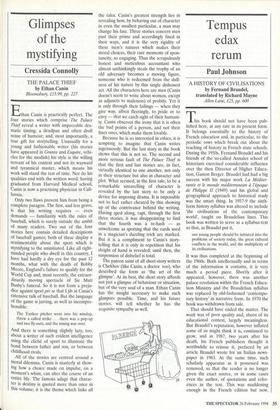Glimpses of the mystifying
Cressida Connolly
THE PALACE THIEF by Ethan Canin Bloomsbury, £15.99, pp. 227 Ethan Canin is practically perfect. The four stories which comprise The Palace Thief reveal a writer with impeccable dra- matic timing; a deadpan and often droll sense of humour; and, most importantly, a true gift for storytelling. Unusually for a Young and fashionable writer (his stories have appeared in Granta and Esquire, vehi- cles for the modish) his style is the willing servant of his content and not its wayward and tyrannical master, which means his work will stand the test of time. Nor do his qualities end with the written word: having graduated from Harvard Medical school, Canin is now a practising physician in Cali- fornia.
Only two flaws prevent him from being a complete paragon. The first, and less grave, is that his writing requires — even demands — familiarity with the rules of baseball, which is surely outside the ambit of many readers. Two out of the four stories here contain detailed descriptions of baseball games; both of these display a sentimentality about the sport which is mystifying to the uninitiated. Like all right- minded people who dwell in this country, I have had hardly a dry eye for the past 12 months, what with the death of Bobby Moore, England's failure to qualify for the World Cup and, most recently, the extraor- dinarily moving spectacle of Sir Matt Busby's funeral. So it is not from a preju- dice against sport per se that I jib at Canin's extensive talk of baseball. But the language of the game is jarring, as well as incompre- hensible:
The Yankee pitcher went into his windup, threw a called strike . . . there was a pop-up and two fly-outs, and the inning was over.
And there is something slightly lazy, too, about a Writer of such evident intelligence using the cliche of sport to illustrate the bond between father and son, or between Childhood rivals.
All of the stories are centred around a moral dilemma. Canin is masterly at show- ing how a choice made on impulse, on a moment's whim, can alter the course of an entire life. The famous adage that charac- ter is destiny is quoted more than once in this volume; it is the theme which links all the tales. Canin's greatest strength lies in revealing how, by behaving out of character in even the smallest particular, a man may change his fate. Three stories concern men past their prime and accordingly fixed in their ways, and it is the very rigidity of these men's natures which makes their moral choices, their rare moments of spon- taneity, so engaging. Thus the scrupulously honest and meticulous accountant who almost unthinkingly steals the trophy of an old adversary becomes a moving figure, someone who is redeemed from the dull- ness of his nature by this single dishonest act. All the characters here are men (Canin doesn't seem to write about women, except as adjuncts to maleness) of probity. Yet it is only through their failings — when they give way, albeit fleetingly, to pride or to envy — that we catch sight of their humani- ty. Canin observes the irony that it is often the bad points of a person, and not their finer ones, which make them lovable.
Because he is so interested in ethics, it is tempting to imagine that Canin writes ingenuously. But the last story in the book shows that this is not so. The second and more serious fault of The Palace Thief is that the first and last stories are, in fact, virtually identical to one another, not only in their structure but also in character and plot. What seemed, in the first tale, to be a remarkable unravelling of character is revealed by the last story to be only a device for imposing drama. It is impossible not to feel rather cheated by this showing up of the contrivance behind the writing. Having sped along, rapt, through the first three stories, it was disappointing to find that the fourth was a re-hash — as unwelcome as spotting that the cards used in a magician's dazzling trick are marked. But it is a compliment to Canin's story- telling that it is only in repetition that his sleight of hand is revealed; until then, the suspension of disbelief is total.
The patron saint of all short-story writers is Chekhov (like Canin, a doctor too), who described the form as 'the art of the glimpse'. At its best, the short story affords not just a glimpse of behaviour or situation, but of the very soul of a man. Ethan Canin has the insight necessary to make such glimpses possible. Time, and his future stories, will tell whether he has the requisite sympathy as well.


























































 Previous page
Previous page